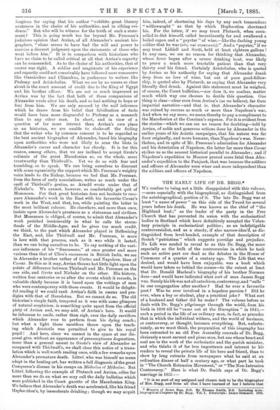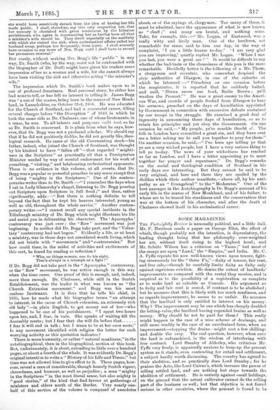THE EARLY LIFE OF DR. BEGG.* WE confess to being
not a little disappointed with this volume, —more especially with the biographical, as distinguished from the autobiographical, portion of it. The late Dr. Begg was at least " a name of power " on this side of the Tweed for several years before his death. He was known as the chief of " the Highland host ;" as the leader of the party in the Free Church that has prevented its union with the ecclesiastical bodies in Scotland which have definitively accepted the Voluntary principle in ecclesiastical politics ; as an indefatigable controversialist, and as a sturdy, if also narrow-idea'd, as distinguished from level-headed, example of that description of Scotch " patriotism " which suggests porridge and prejudice. No Life was needed to reveal to us this Dr. Begg, the more especially as the balk of the controversies in which be took such an active part are dead as the debates in the House of Commons of a quarter of a century ago. The Life that was desired, and would have been enjoyable, was a book which would have taken us behind the scenes—to the extent at least that Dr. Donald Macleod's biography of his brother Norman does—and would have indicated what sort of man James Begg was. Surely his life was not all catechism, controversy, and "calls " to one congregation after another P Had he ever a favourite poet ? Was he ever involved in a hopeless passion ? Did he ever, when a boy or student, play a practical joke ? What sort of a husband and father did he make ? The volume before us deals with Dr. Begg's pilgrimage through the world, from his birth in 1808 till he "came out at the Disruption" in 1843,— such a period in the life of an ordinary man, in fact, as precedes that in which the individual withers, and the world of business, or controversy, or thought, becomes everything. Bat, unfortunately, as we must think, the preparation of this biography has been entrusted to an old Free Assembly comrade of Dr. Begg, obviously a most earnest and pions man, but one whose heart and soul are in the work of the ecclesiastic and the parish minister, and who thinks it of far less importance and interest to his readers to reveal the private life of his hero and friend, than to show by long extracts from newspapers what he said at an ordination dinner of half a century ago, or what part he took in " The Church Extension Movement," or " The Non-Intrusion Controversy." Here is what Dr. Smith says of Dr. Begg's marriage in 1835 :—
" It is no part of my assigned and chosen task to be the biographer of Mrs. Begg, and from all that I have learned of her I believe that
she would have sensitively shrank from the idea of having her life made public. I shall, therefore, say this only respecting her, that her memory is cherished with great tenderness by the Liberton parishioners, who agree in representing her as having been all that a minister's wife should be. They dwell especially on the assiduity with which she visited the sick, when ecclesiastical affairs called her husband away, perhaps too frequently, from home. I shall scarcely have occasion to say more of Mrs. Begg until I shall have to record her premature removal."
But surely, without making Mrs. Begg's life " public" in any way, Dr. Smith (who, by the way, must not be confounded with
the biographer of Dr. Duff) might have given his readers some impression of her as a woman and a wife, for she cannot always have been visiting the sick and otherwise acting "the minister's wife."
The impression which Dr. Smith's book makes upon us is one of profound dreariness. Real personal story, he either has had none to tell, or has felt no interest in telling it. James Begg was " a son of the manse, being born in the manse of New Monkland, in Lanarkshire, on October 31st, 1808. He was educated for the Church of Scotland, and had a successful career, filling several charges before "the Disruption " of 1843, in which he
took the same side as Dr. Chalmers, one of whose lieutenants, in a sense, he was. To all intents and purposes voilA, tout, so far
as Dr. Smith is concerned. It is plain from what he says, however, that Dr. Begg was not a profound scholar. We should say that if he did not positively dislike, he did not greatly like, theo logical research. He came of the old Covenanting stock—his father, indeed, who joined the Church of Scotland, was thought by his kindred to have " fallen off "—that regarded " mightiness in the Scripture" as practically all that a Presbyterian Minister needed by way of mental endowment for his work of preaching, " visiting," and belabouring ecclesiastical opponents. There is no evidence in this volume, at all events, that Dr.
Begg was a popular or powerful preacher in any sense except that of being " mighty in the Scriptures." One of his contem poraries writes thus to Dr. Smith :—" I remember the days when I sat in Lady Glenorchy's chapel, listening to Dr. Begg pouring out Scripture upon Scripture in full flood ;" and then, rather significantly, adds :—" But there is nothing definite to tell beyond the fact that he kept his hearers interested, young as well as old, throughout the whole service." Another contem porary writes :—" I cannot recall any special incidents in the Edinburgh ministry of Dr. Begg which might illustrate his life and assist you in delineating his character. The Apocrypha' controversy was just over ; the Row' movement was just beginning. In neither did Dr. Begg take part, and the Volun tary' controversy had not begun." Evidently a life. or at least a ministry, was in these days not considered worth living, which did not bristle with " movements " and" controversies." But how could time, in the midst of activities and excitements of this sort, be found for reading or reflection ?
" Who, on things remote, can fix his sight, That's always in a triumph or a fight ?"
If Dr. Begg did not take part in the " Apocrypha " controversy, or the " Row" movement, he was active enough in this way when the time came. One proof of this is enough, and, indeed, more than enough. Dr. Chalmers, while still in the Scotch Establishment, was the leader in what was known as "the Church Extension movement," and Begg was his most zealous lieutenant. It is thus that he tells his chief, in 1835, how he made what his biographer terms " an attempt to interest, in the cause of Church extension, an extremely rich old lady "—in plain English, to get money out of her—who happened to be one of his parishioners. " I spent two hours upon her, and, I fear, in vain. She speaks of waiting till the Assembly meets; but I fear that she will die before that I fear it will end in talk ; but I mean to be at her once more."
Is any movement identified with religion the better for such worrying activity as this quotation indicates ?
There is more humanity, or rather " natural manliness," in the autobiographical, than in the biographical, section of this book.
But, unfortunately, it is short, extending to little over a hundred pages, or about a fourth of the whole. It was evidently Dr. Begg's original intention to write a " History of his Life and Times ;" but time was not allowed him to give effect to it. These pages, however, reveal a man of considerable, though homely Scotch vigour, shrewdness, and humour, as well as prejudice ; a man " mighty in the Scriptures " in the most literal sense, but also mighty in "good stories," of the kind that find favour at gatherings of ministers and elders north of the Border. Very nearly onehalf of this section of the volume is composed of anecdotes about, or of the sayings of, clergymen. Too many of these, it must be admitted, have the appearance of what is now knOwn as " chaff ;" and many are brutal, and nothing more. Take, for example, this :—" Mr. Logan, of Eastwood, was a really witty and lively man. One of the brethren, not remarkable for sense, said to him one day, in the way of complaint, I am a little hoarse to-day.' I am very glad you are improving,' quietly replied Mr. Logan. When I saw you last, you were a great ass !' " It would be difficult to say whether the bad-taste or the clumsiness of this pun is the more remarkable. Decidedly better is the following of a Mr. Thom, a clergyman and eccentric, who somewhat despised the civic authorities of Glasgow, in one of the suburbs of which he laboured :—" Preaching on one occasion before the magistrates, it is reported that he suddenly halted, and said, Dinna snore sae loud, Bailie Brown ; ye'll wauken the Provost.'" He was a great enemy to the American War, and crowds of people flocked from Glasgow to hear his sermons, preached on the days of humiliation appointed by Government in connection with successive defeats sustained by our troops in the struggle. He exercised a good deal of ingenuity in announcing these days of humiliation, so as to retain his principles and yet obey the Government. On one occasion he said,—" My people, ye're muckle thocht o'. The folk in London have committed a great sin, and they have sent me a letter asking me to call you together to pray for them." On another occasion, he said,—" I've been aye telling ye that ye are a very wicked people, but I have a very serious thing to tell ye to-day. The news of your wickedness has reached as far as London, and I have a letter appointing ye to meet together for prayer and repentance." Dr. Begg's remarks on the social and theological condition of Scotland in his early days are interesting. But they cannot be said to be very original, and here and there they are spoiled by the dislikes which their author manifests,—above all, by his antipathy as an " Evangelical" to the "Moderates." One of the best passages in the Autobiography is Dr. Begg's account of his early life in the manse of New Monkland, and of his father, to whom are to be traced his sturdiness and the conservatism that was at the bottom of his character, and after the death of Chalmers showed itself in his ecclesiastical career.















































 Previous page
Previous page